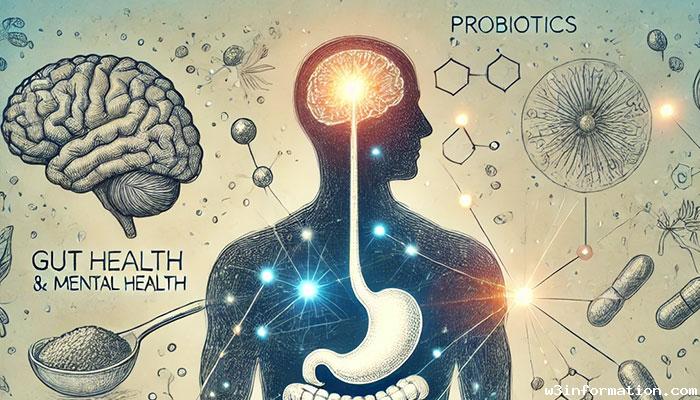The Link Between Gut Health and Mental Health
Recent studies have focused extensively on the link between gut health and mental health. Recent studies demonstrate that the gut-brain axis functions as a sophisticated communication network which impacts both physical health and mental health. This blog explores how gut health affects mental health by examining scientific research alongside contributing elements and practical steps for enhancement.
Understanding the Gut-Brain Axis
The gut-brain axis is the two-way communication network that connects the gastrointestinal system with the central nervous system. This connection serves as a fundamental regulator for both emotional states and cognitive processes.

Components of the Gut-Brain Axis
- Microbiota: The gut contains trillions of microorganisms which send chemical signals that influence brain function.
- Vagus nerve: The vagus nerve serves as a communication pathway which connects the gastrointestinal system to the brain.
- Neurotransmitters: Serotonin functions as a chemical messenger that regulates mood and behavior while being produced primarily in the gut.
How the Gut Communicates with the Brain
The gut communicates with the brain through:
· Neural pathways: Via the vagus nerve and spinal cord.
· Hormonal signaling: Through hormones like cortisol and gut peptides.
Immune responses: Triggered by gut microbes that influence inflammation
The collection of microorganisms in the digestive system plays a significant role in maintaining mental health.
The brain's functioning and mental health states are influenced by the diverse bacterial, viral, and fungal populations found within the digestive tract.
Gut microbes generate neurotransmitters like serotonin and dopamine together with gamma-aminobutyric acid (GABA) which help regulate emotional states as well as sleep patterns.
When gut microbiota becomes unbalanced through dysbiosis it triggers inflammatory responses. Research shows that persistent inflammation contributes to mental health issues including depression and anxiety.
The health of the gut influences the hypothalamic-pituitary-adrenal (HPA) axis which controls how the body responds to stress. An imbalanced gut can exacerbate stress-related disorders.
Factors Affecting Gut and Mental Health
Different elements determine how gut health interacts with mental well-being.
Consuming fiber-rich foods with probiotics and prebiotics helps maintain healthy gut microbiota whereas processed foods and sugar-rich diets disturb gut equilibrium.
Regular antibiotic use along with some medications leads to changes in gut microbiota which can affect mental health.
Stress along with insufficient sleep and inactive routines harm gut health which in turn affects mental well-being.
Improving Gut and Mental Health
Improving gut health leads to better mental health outcomes. Here are some evidence-based strategies:
Adopt a Gut-Friendly Diet
Your diet should contain fermented foods such as yogurt, kimchi, and kefir to benefit from their probiotic properties.
Nourish your gut bacteria by consuming high-fiber foods including fruits, vegetables, and whole grains.
Manage Stress Levels
Using mindfulness exercises together with meditation or yoga techniques can help lower stress while improving gut-brain communication.
Regular physical activity improves both gut health and mental health.
To safeguard gut microbiota only use antibiotics when medically necessary and under professional guidance.
The use of probiotic supplements has potential benefits in restoring gut health while simultaneously helping to alleviate depression and anxiety symptoms. Consult a healthcare professional before starting supplements.
Future Research and Implications
The research exploring gut health's impact on mental health continues to expand as it shows significant promise for developing new treatments and preventive measures for mental health disorders.
The study of gut microbiota advancements enables the development of individualized treatments based on each person's unique microbiome composition.
Studying psychobiotics which are live bacteria that provide mental health benefits creates new therapeutic possibilities for depression and anxiety.
Conclusion
Understanding the link between gut health and mental health highlights why a holistic approach to well-being is essential. People who focus on their gut health by making dietary adjustments and lifestyle modifications while receiving expert medical guidance can improve their mental health condition and enhance their overall life satisfaction. Studies which investigate the gut-brain axis demonstrate growing potential for mental health improvements through gut health strategies.
 Top 10 Comfort Foods to Try This Winter
Top 10 Comfort Foods to Try This Winter
 Top 10 Christmas Destinations Around the World
Top 10 Christmas Destinations Around the World
 Navigating Adolescence: Tips for Parents and Teens
Navigating Adolescence: Tips for Parents and Teens
 How to Start a DIY Craft Project on a Budget
How to Start a DIY Craft Project on a Budget
 How to Build Strong Family Bonds in the Digital Age
How to Build Strong Family Bonds in the Digital Age
 The Importance of Early Childhood Education
The Importance of Early Childhood Education